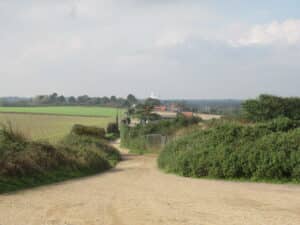Support us from £3/month
We deal with almost 1000 cases a year assisting communities, groups and individuals in protecting their local spaces and paths in all parts of England and Wales. Can you help us by joining as a member?
‘The Open Spaces Society is often critical of the government’s approach to open access opportunities.’ So said our chairman, Phil Wadey, in his keynote speech our AGM on 6 July.

Photo of restricted byway, between North Walsham and Mundesley in Norfolk, recorded on the definitive map in 2021 following an application by the Open Spaces Society. Photo: Open Spaces Society
He continued: ‘Back in January, the government announced an environmental improvement plan for England which aspired to having every household no more than “a 15-minutes’ walk of a green or blue space”. We called for such green space to be permanent in nature, such as by registration as a town or village green, or by dedication of public rights of way, but there remains no detail on how the plan will be made effective.
‘Nearly 17 years ago, the Commons Act 2006 allowed the reopening of common-land registration in certain circumstances in designated local authority areas [pioneer areas]. The window for making applications was short: only 13 years was allowed in each of the pioneer areas in England. This led to the society appointing staff and consultants to beat the deadline, and we have applied for 86 pieces of land to be registered as common so far.
‘While deadlines with clear effect can be useful to stimulate public response, other deadlines can be far more sinister,’ said Phil.
‘We were dismayed when the Secretary of State for Environment, Food and Rural Affairs, Dr Coffey, announced plans to reintroduce the cut-off date, more accurately known as Path Extinguishment Day, that her department had decided to repeal last year, without ever knowing exactly what they are extinguishing. We continue to lobby for the exemptions to be brought in at the same time as the cut-off date provisions are commenced, as we fear that government will otherwise not get around to the exemptions that will save some of our rights of way.
‘I therefore call on all who can to go out and apply to record the rights of way they use that are not yet on the definitive map: let’s see if the various user groups and volunteers can do as well with rights of way recording (in percentage terms) as we have with commons recording, and let’s see if recording our paths means that more households will be close to guaranteed green spaces,’ Phil concluded.
